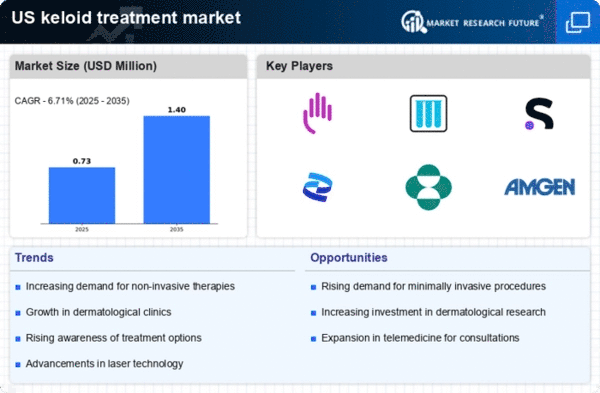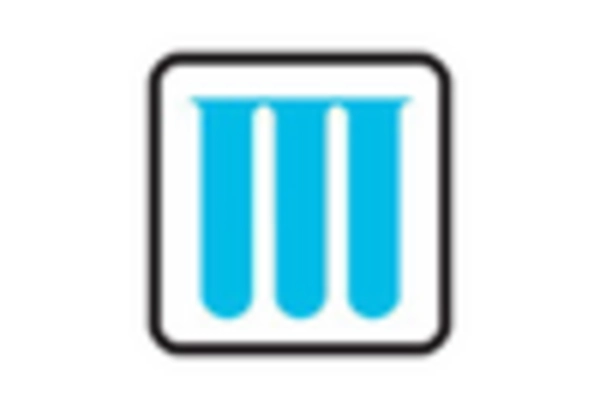Growing Cosmetic Concerns
The keloid treatment market is being propelled by growing cosmetic concerns among individuals. As societal standards of beauty evolve, there is an increasing emphasis on skin appearance, leading many to seek treatment for keloids that may affect their self-esteem. The desire for flawless skin is particularly pronounced among younger demographics, who are more likely to pursue aesthetic treatments. This trend is reflected in the rising number of consultations for keloid treatments, with estimates suggesting a 20% increase in inquiries over the past year. Additionally, the cosmetic industry is increasingly recognizing the importance of addressing keloids, leading to collaborations between dermatologists and cosmetic practitioners. This synergy is likely to enhance the visibility of keloid treatments, thereby expanding the keloid treatment market.
Rising Incidence of Keloids
The keloid treatment market is experiencing growth due to the rising incidence of keloids among the population. Keloids, which are raised scars that form due to excessive collagen production during the healing process, affect a significant number of individuals, particularly those with darker skin tones. Studies indicate that approximately 10-15% of individuals with darker skin types may develop keloids, leading to increased demand for effective treatment options. This growing prevalence is prompting healthcare providers to seek innovative solutions, thereby driving the keloid treatment market forward. Furthermore, the increasing number of surgical procedures, which can lead to keloid formation, is likely to contribute to market expansion. As awareness of keloids increases, patients are more inclined to seek treatment, further propelling the keloid treatment market's growth.
Increased Research and Development
The keloid treatment market is benefiting from increased research and development efforts aimed at understanding keloid formation and treatment. Ongoing studies are exploring the genetic and molecular mechanisms behind keloid development, which may lead to more targeted therapies. For instance, research into the role of fibroblasts in keloid formation is paving the way for innovative treatment approaches. Furthermore, pharmaceutical companies are investing in clinical trials to evaluate new drugs and therapies, which could significantly alter the treatment landscape. The National Institutes of Health (NIH) has allocated funding for research on keloids, indicating a commitment to advancing knowledge in this area. As new findings emerge, they are likely to enhance treatment options available in the keloid treatment market.
Advancements in Treatment Modalities
The keloid treatment market is significantly influenced by advancements in treatment modalities. Recent innovations in laser therapy, cryotherapy, and intralesional corticosteroid injections have enhanced the effectiveness of keloid management. For instance, laser treatments have shown promising results in reducing keloid size and improving skin texture, appealing to patients seeking aesthetic improvements. The introduction of new technologies, such as 3D printing for custom silicone sheets, is also revolutionizing treatment options. According to market analysis, the laser treatment segment is projected to grow at a CAGR of 8% from 2025 to 2030, indicating a robust demand for advanced therapies. These advancements not only improve patient outcomes but also stimulate the keloid treatment market by attracting more patients seeking effective solutions.
Regulatory Support for Treatment Innovations
The keloid treatment market is positively impacted by regulatory support for treatment innovations. Regulatory agencies, such as the Food and Drug Administration (FDA), are increasingly approving new therapies and devices aimed at keloid management. This support not only facilitates the introduction of novel treatments but also instills confidence in both healthcare providers and patients. For example, recent approvals for new laser devices and injectable treatments have expanded the options available for keloid management. The regulatory environment is becoming more conducive to innovation, which is likely to encourage further investment in the keloid treatment market. As new treatments gain approval, the market is expected to witness a surge in demand, driven by both healthcare professionals and patients seeking effective solutions.
















